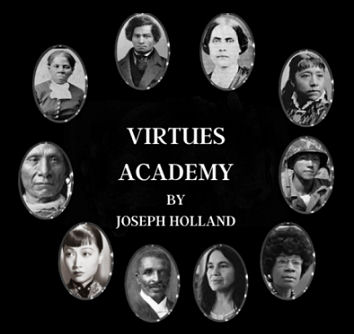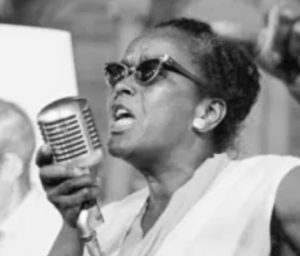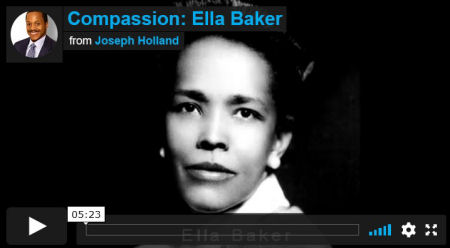
Ella Baker
WORD OF THE DAY
PERSONAL CONTEXT
HISTORICAL CONTEXT
SUCCESS PRINCIPLE
CIVICS LESSON
Click below to listen to audio:
UPLIFT THE DISADVANTAGED
Remember, we are not fighting for the freedom of the Negro alone, but for the
freedom of the human spirit, a larger freedom that encompasses all mankind.
Ella Baker
In 1943 civil rights activist Ella Baker was named Director of Branches of the National Association for the Advancement of Colored People (“NAACP”). Traveling throughout the South to organize new chapters, Baker laid the foundation not only for the expansion of the NAACP in this region but also for the launch of the Civil Rights Movement a decade later. Baker believed that organizational strength stemmed from individuals working together at the grassroots. She emphasized treating everyone with dignity and respect, especially those at the bottom rung of society, seeking to rise from underprivileged circumstances. Baker’s quest was not to be in the public limelight but to work in the neighborhood trenches where she could make a difference.
You didn’t see me on television; you didn’t see news stories about me. The kind of role that I tried to play was to pick up pieces or put together pieces out of which I hoped organization might come. My theory is: Strong people don’t need strong leaders.
Baker’s commitment to uplift disadvantaged people moved her from the NAACP to the Southern Christian Leadership Conference, to the Student Nonviolent Coordinating Committee, to the Southern Conference Education Fund. Her mission transcended the struggle for racial justice; her vision was the inner liberty that propelled every individual.
Heed Baker’s example. Disadvantaged people should not be ignored, rejected, mistreated or stereotyped. The best thing to do is to uplift them, affirming their dignity by extending opportunity, helping them to see themselves in a different light. If you are or have been disadvantaged at some point in your life, Baker’s wisdom is for you. If you have encountered the disadvantaged in your personal universe, engage them instead of dismissing them. Help guide them on an inward journey that will change the trajectory of their lives. Challenge them — and yourself — with these questions.
WHERE ARE YOU?
This was the first question God asked Adam in the Garden of Eden after he and Eve had sinned. The query was more about their emotional and spiritual condition than a physical location. Ask this question to help individuals get beyond surface symptoms to root causes, so they can understand more objectively where they are on life’s journey in relation to their goals. Help them delve deeply into this question, to understand better their inner strengths and weakness; this isthe first step in helping them make a positive move to rise out of whatever situation they’re in.
WHAT DO YOU WANT?
Some people never get to respond to this question because they’re too troubled by what they don’t have. Keep it simple. Your mission in asking it is not to psychoanalyze but only to shift the perspective from past problems to future goals. Baker stayed in people’s homes to create the comfort level for them to open up. You must get close enough to gain understanding, to help them connect the dots: once they’re on solid emotional and spiritual ground it’s easier for them to reach for their true desires. Share your own story — highlighting your challenges — to help them be transparent about theirs.
WHAT CAN I DO TO HELP?
This question is the most important one for you to ask the person in need. Listen carefully to the response, discern between and beneath the words. The homeless need more than a place to stay, a hungry person more than a meal, an angry person more than someone to strike. Uplifting people starts with your understanding where they are stuck — what the true need is. From there your mission is to help them get into a position to solve the problem themselves. That’s the only way to bring about a permanent solution. That’s what compassion is really all about.
KEY POINTS
WORD OF THE DAY
Transcend – to rise above or go beyond the limits of; surpass (a person or achievement).
PERSONAL CONTEXT
Born in Norfolk, Virginia in 1903, Ella Baker endured a challenging upbringing. Employed by a steamship line, her father was often at sea, and her mother was frequently preoccupied with the boarders she took in to earn extra money. The 1910 Norfolk race riot — Whites attacked Black shipyard workers — compelled her mother to leave Norfolk for her hometown in rural North Carolina. There Baker was enlightened by her grandmother’s stories of sufferings growing up in slavery; she told her granddaughter the account of how she was whipped for refusing to marry the enslaved man whom the plantation owner had chosen for her.
HISTORICAL CONTEXT
For more than five decades, Baker worked to advance the causes of civil rights and human rights. Her early activism was during the 1930s in New York City, where she founded the Negro History Club at the Harlem Library among other community-based initiatives. Her greater impact was in the South over the succeeding decades where she worked mostly behind the scenes alongside Martin Luther King Jr. and other civil rights leaders as well as assisting Bob Moses, Diane Nash, Stokely Carmichael and other young activists. Some historians regard her as the most influential Black woman leader of the civil rights era.
SUCCESS PRINCIPLE
See Success Principle Worksheet
CIVICS LESSON
See Civics Lesson Worksheet
*See Ella Baker Video for more information


